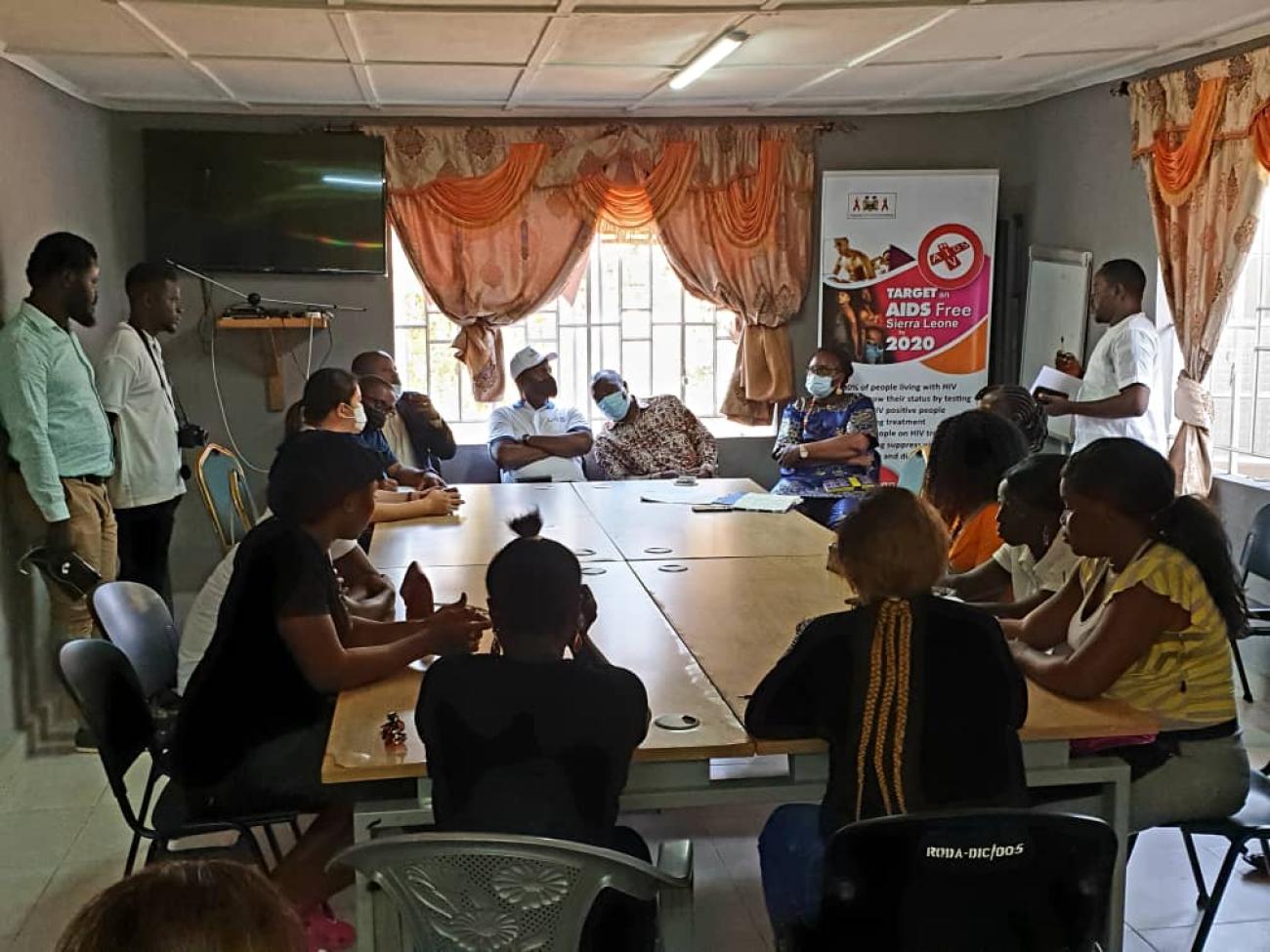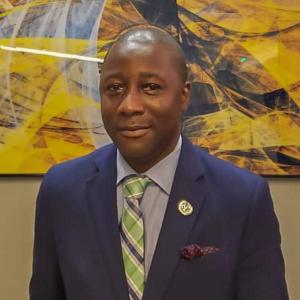A cross-section of female sex workers and vulnerable young women in Makeni City, Bombali District met with the UN Resident Coordinator (RC) Mr Babatunde Ahonsi, UNDP Resident Representative Mr. Pa Lamin Beyia, IOM Officer-In-Charge Mr. James Bagonza, and UNIDO Country Representative Ms. Mariatu Swaray on Tuesday, 2 November 2021.
This engagement was held at a drop-in centre of Rofutha Development Association (RODA), a local partner of UNAIDS. During the meeting, the vulnerable women expressed their hope to become self-reliant and abandon the sex trade if provided with alternative means of livelihoods
Lady P, an advocate and organization lead of sex workers in northern Sierra Leone, expressed her gratitude to the UN delegation’s interest to meet and listen to sex workers, as her group is often excluded from such engagements. Lady P recounted that her group has been left out from the recent distribution of bed nets, have not been invited to social activities, and most times, subjected to paying extra for healthcare services – which she believes, would be otherwise free. She also informed the RC and UN team of incidents of assault her group has incurred from authorities, particularly when they are arrested for loitering.
RODA has trained over 200 women and girls involved in the sex trade within Makeni township between 2018 and 2019 on entrepreneurship and financial management, HIV prevention and positive living, and STI management.
Ms. Hawanatu Kalokoh, another sex worker, said that while they were beneficiaries of RODA's vocational training programmes and start-up kits, the COVID-19 pandemic has increased the number of women and girls in the sex trade, including some that were already positive deviants before the pandemic. In view of this, it will be impactful if more beneficiaries can be identified and supported.
To ensure that RODA’s interventions are successful, the female sex workers highlighted their support including working as peer educators to get other young women off the streets of Makeni town and its environs.
RODA Programme Coordinator, Mr. Aruna Rashid Koroma expressed appreciation for the interaction with his beneficiaries whom he described as vulnerable youth on the sidelines of the National Youth Summit in Magburaka. He indicated that RODA is working with sex workers because they are considered a core group for the transmission of HIV and other sexually transmitted diseases (STDs). "They also faced HIV-related gender discrimination, harmful gender norms, restrictive legal environment, low access to public health services due to related stigma, and violence," he said.
The RC said he hopes that the conversation and response to the issues of sex workers would continue. "Their biggest desire is for viable alternative livelihoods, and there is no question that this would address many of the other issues they are facing." Mr Ahonsi also highlighted UN support to the most vulnerable communities, underscoring Outcome 4 of the UN Sustainable Cooperation Framework on Protection and Empowerment of the Most Vulnerable.
UNAIDS provides support to address inequality gaps within the national HIV and AIDS response include technical input in resource mobilization from Global Fund and other donors; accompaniment of PLHIV and Key Population (KP) led organizations for proposal development; capacity building; and evidence generation on human rights, and stigma and discrimination which support advocacy and planning. These contribute to the design and implementation of meaningful interventions, leveraging of capacity within the UN Joint Team to ensure the effectiveness of the national HIV & AIDS response, and position PLHIV and KP organizations to directly implement and advocate for vulnerable people including sex workers.
With support from the Global Fund, RODA is implementing a comprehensive HIV/STI Programmes with Sex Workers and their clients in the North-East and Northwest of Sierra Leone. The project focuses on community empowerment; condom and lubricant programming; legal literacy ("Know Your Rights"); HIV and HIV related legal services; stigma and discrimination reduction, reducing gender-related discrimination and violence against women and girls in all their diversity; human rights and medical ethics for health care providers; sensitization of lawmakers and law-enforcement agents; and community mobilization and advocacy.
UNAIDS Country Director, Dr. Isaac Ahemesah said, “we have over 59 children living with the female sex workers in 2 brothels. Thirty percent of them are below 18 years and that SGBV and drug use is extremely high among them.” He also noted that HIV prevalence is 6.8 percent among the female sex workers compared to national average of 1.7 percent.






